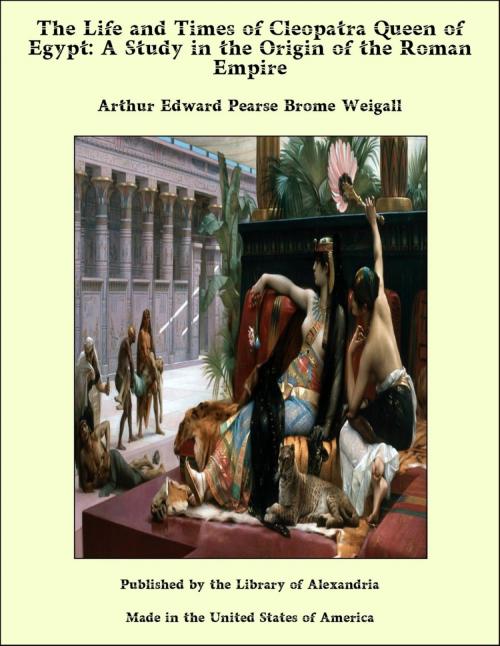The Life and Times of Cleopatra Queen of Egypt: A Study in the Origin of the Roman Empire
Nonfiction, Religion & Spirituality, New Age, History, Fiction & Literature| Author: | Arthur Edward Pearse Brome Weigall | ISBN: | 9781465613844 |
| Publisher: | Library of Alexandria | Publication: | March 8, 2015 |
| Imprint: | Language: | English |
| Author: | Arthur Edward Pearse Brome Weigall |
| ISBN: | 9781465613844 |
| Publisher: | Library of Alexandria |
| Publication: | March 8, 2015 |
| Imprint: | |
| Language: | English |
In the following pages it will be observed that, in order not to distract the reader, I have refrained from adding large numbers of notes, references, and discussions, such as are customary in works of this kind. I am aware that by telling a straightforward story in this manner I lay myself open to the suspicions of my fellow-workers, for there is always some tendency to take not absolutely seriously a book which neither prints chapter and verse for its every statement, nor often interrupts the text with erudite arguments. In the case of the subject which is here treated, however, it has seemed to me unnecessary to encumber the pages in this manner, since the sources of my information are all so well known; and I have thus been able to present the book to the reader in a style consonant with a principle of archæological and historical study to which I have always endeavoured to adhere—namely, the avoidance of as many of those attestations of learning as may be discarded without real loss. A friend of mine, an eminent scholar, in discussing with me the scheme of this volume, earnestly exhorted me on the present occasion not to abide by this principle. Remarking that the trouble with my interpretation of history was that I attempted to make the characters live, he urged me at least to justify the manner of their resuscitation in the eyes of the doctors of science by cramming my pages with extracts from my working notes, relevant or otherwise, and by smattering my text with Latin and Greek quotations. I trust, however, that he was speaking in behalf of a very small company, for the sooner this kind of jargon of scholarship is swept into the world’s dust-bin, the better will it be for public education. To my mind a knowledge of the past is so necessary to a happy mental poise that it seems absolutely essential for historical studies to be placed before the general reader in a manner sympathetic to him. “History,” said Emerson, “no longer shall be a dull book. It shall walk incarnate in every just and wise man. You shall not tell me by languages and titles a catalogue of the volumes you have read. You shall make me feel what periods you have lived.” Such has been my attempt in the following pages; and, though I am so conscious of my literary limitations that I doubt my ability to place the reader in touch with past events, I must confess to a sense of gladness that I, at any rate, with almost my whole mind, have lived for a time in the company of the men and women of long ago of whom these pages tell.
In the following pages it will be observed that, in order not to distract the reader, I have refrained from adding large numbers of notes, references, and discussions, such as are customary in works of this kind. I am aware that by telling a straightforward story in this manner I lay myself open to the suspicions of my fellow-workers, for there is always some tendency to take not absolutely seriously a book which neither prints chapter and verse for its every statement, nor often interrupts the text with erudite arguments. In the case of the subject which is here treated, however, it has seemed to me unnecessary to encumber the pages in this manner, since the sources of my information are all so well known; and I have thus been able to present the book to the reader in a style consonant with a principle of archæological and historical study to which I have always endeavoured to adhere—namely, the avoidance of as many of those attestations of learning as may be discarded without real loss. A friend of mine, an eminent scholar, in discussing with me the scheme of this volume, earnestly exhorted me on the present occasion not to abide by this principle. Remarking that the trouble with my interpretation of history was that I attempted to make the characters live, he urged me at least to justify the manner of their resuscitation in the eyes of the doctors of science by cramming my pages with extracts from my working notes, relevant or otherwise, and by smattering my text with Latin and Greek quotations. I trust, however, that he was speaking in behalf of a very small company, for the sooner this kind of jargon of scholarship is swept into the world’s dust-bin, the better will it be for public education. To my mind a knowledge of the past is so necessary to a happy mental poise that it seems absolutely essential for historical studies to be placed before the general reader in a manner sympathetic to him. “History,” said Emerson, “no longer shall be a dull book. It shall walk incarnate in every just and wise man. You shall not tell me by languages and titles a catalogue of the volumes you have read. You shall make me feel what periods you have lived.” Such has been my attempt in the following pages; and, though I am so conscious of my literary limitations that I doubt my ability to place the reader in touch with past events, I must confess to a sense of gladness that I, at any rate, with almost my whole mind, have lived for a time in the company of the men and women of long ago of whom these pages tell.















